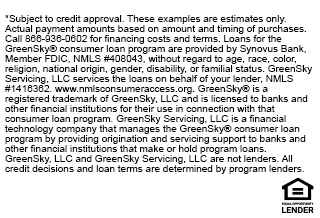Commercial and Residential HVAC Systems: Know the Difference
Whether you own a commercial office building, a retail space, a large farmhouse, or a one-story home, you always need an HVAC system. So, what is an HVAC system? HVAC stands for heating, ventilation, and air conditioning. These systems supply the heat, cool air, and ventilation needed for buildings and structures to maintain a healthy and comfortable environment.
There are two main types of HVAC systems – residential and commercial. Both types have the same goal of providing comfortable indoor air, but they accomplish this differently. While the two are similar, it's important to understand the several key differences between them. When evaluating which HVAC unit will best suit your needs, it's highly recommended to find a service provider that has experience with both.
Commercial HVAC Systems
Commercial HVAC systems can come in one of several popular types but are typically large and complex. They include a variety of components that may need to be replaced on a regular basis, such as filters, coils, and fans. Most commercial systems rely on heat pumps and chillers to create and extract temperature-controlled air from the warm and cool water. Then, mechanical fans circulate air throughout each building floor, removing stale air and controlling humidity.
Commercial HVAC systems typically need to be more efficient than residential units because they're used throughout the year. In addition, the constant usage means these systems must be made from highly durable materials.
Residential HVAC Systems
In contrast, residential systems are usually smaller and less complex. They're designed to heat or cool the home throughout the year but are not built to be used every minute year-round. These systems utilize a combination of an electric heat pump, a gas furnace, a boiler, and a central air conditioner.
Residential HVAC systems are typically far less expensive than commercial units because they don't require the same materials. Residential units may include plastic parts that may not last as long but are easier to replace and cost less for the homeowner. It's important to remember that residential units are designed for smaller homes, so they're not as powerful as the systems needed when heating or cooling multi-story units.
Differences Between Residential and Commercial HVAC Systems
Although both systems serve the same purpose, there are slight differences between commercial or residential units that will be important to know before deciding. Let's look at some of these differences to help you decide which is best suited for your property:
- Location. Residential HVAC systems are commonly installed on the ground or within the ground floor. Commercial HVAC systems are usually found on the roof of business structures. This is because residential units are smaller and are made to service the home, while commercial HVAC systems are built and installed to be out of the way while providing adequate service for large buildings.
- Size and capacity. As you’d expect, residential units are usually much less powerful than commercial units. Residential HVACs usually lack advanced features that help owners of larger buildings save on energy costs. Meanwhile, commercial units are traditionally designed to be more powerful and efficient since they're used constantly throughout the year.
- Weight and portability. Residential HVAC units are usually lighter than commercial HVAC units, making them easier to transport and install. Commercial HVAC systems tend to be heavy and bulky, which helps them stay in place on the roof of a building throughout severe weather and continuous use.
- Cost. Residential HVAC units are less expensive than commercial units. This is the primary reason they're commonly found in residential properties with a smaller budget. Commercial units are more expensive because of the additional features and materials that make them more durable and efficient.
Deciding Between Commercial and Residential HVAC Systems
Both commercial and residential units are necessary to maintain comfortable indoor temperatures, but they offer distinctive features. When deciding which is best for you, it's important to consider your specific needs. Ask yourself the following questions when choosing an HVAC unit for your property:
- What's the size and capacity of my property? Taking these factors into consideration is important to choose which system is best for you. A smaller property doesn’t require a large system, but a bigger property may need a commercial system.
- What is my budget? If your business has a smaller budget, then a residential unit may be the better choice. If you have more cash to spend, commercial HVAC systems are usually more effective and efficient in the long run.
- Where will I install or store this system? If you need a system that can withstand outdoor conditions, such as rain and snow, a commercial HVAC system is best. If you have a smaller home or office with space to install an indoor unit, a residential HVAC system may be better.
- How does it need to be powered? Residential units are usually connected to a home's electrical system, while commercial HVAC systems can be powered by electricity or gas.
- What is the system’s anticipated lifespan? Residential units are designed for less strenuous use and usually have a shorter lifespan. However, you should still expect to perform care and maintenance on a commercial unit for years to come.
Where to Begin
Professional HVAC technicians can guide and support you through the purchasing process. You'll find comfort in knowing that not only will the professionals ensure you have the right system for your needs, but that they can also complete installation, maintenance, and repairs for you.
Smith & Company HVAC is a reputable residential and commercial HVAC company based in Crownsville, MD. If you’re looking to purchase an HVAC system for your building, we can help ensure you choose the right HVAC system for your business or home. Our emergency services are available 24/7, so we’ll always be here. Our HVAC technicians also supply regular maintenance and inspections, so you can rest assured knowing your HVAC system is always running at peak performance. Contact Smith & Company HVAC today for more information.
Request A Quote Today
We will get back to you as soon as possible
Please try again later
GreenSky® Credit Program Finance Module Usage Guidelines
By using the GreenSky® Credit Program Finance Module product, you(the merchant and/or merchant’s assignees) agree to follow the below conditions during implementation:
1) Do not alter the embed code created using this tool in ANY way — Should GreenSky’s branding, compliance language or plan terms change, GreenSky® retains the ability to update imagery in the module remotely.
2) Module should not be placed in proximity to any content or imagery that may be damaging to GreenSky, LLC or the GreenSky® Program brand — The GreenSky® Program Finance Module should not be implemented on any page or site that may, by association or otherwise, result in damage to GSTC or the GreenSky® Program brand.
3) Merchant agrees to adhere to the GreenSky® Program Merchant Marketing Guidelines to ensure ethical and best practices are followed.






